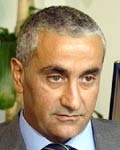

-
....http://www.ihsglobalinsight.com/SDA/SDADetail19483.htm
Jordan's Intelligence Chief Sacked: New PNAC, ZIOCON marching Orders going forward....as usual...
On January 2, in the midst of Israeli military operations in the Gaza Strip, Jordan's King Abdullah removed General Intelligence Department (GID) head Muhammad Dahabi from his post and replaced him with Gen. Muhammad Raqqad, a deputy in the organization. Dahabi, who is the brother of Prime Minister Nader Dahabi, leaves at a critical time for Jordanian security. The reasons for Dahabi's dismissal are not clear but may relate to the GID's handling of the 2008 rapprochement with Hamas or to Dahabi's unwelcome forays into the political arena.
In either case, his successor is likely to take the organization on a "different" path....?
The MOSSAD Factor
Dahabi is widely believed to have been a driving force behind King Abdullah's summer 2008 decision to thaw relations with Hamas -- frozen since 2000 -- as well as Jordan's subsequent decision to improve its relationship with Syria and Qatar. Eight years after expelling Hamas leaders from Jordan, and two years after embarking on a policy of isolating the Islamist group to strengthen Palestinian president Mahmoud Abbas, the shift in policy toward Hamas, Syria, and Qatar suggests the GID had little confidence that Abbas would prevail.
The GID director was responsible for opening relations with Hamas, and the move appears to have been influenced by several factors: first, Dahabi mistrusted Fatah, the dominant faction in the Palestine Liberation Organization, which Abbas heads, and was concerned that Fatah elites might negotiate a peace deal with Israel at the expense of Jordanian interests; second, the GID hoped Hamas would stymie those who saw Jordan as an "alternative homeland" for the Palestinians. Simply put, Dahabi sought to protect Jordan from the "Jordanian option."
Within the GID, the working assumption was that the Palestinian Authority (PA) under Abbas would collapse in 2009, either leaving a power vacuum or allowing Hamas to take the helm. In either case, the GID assumed that Hamas would prevent the influx of West Bank Palestinians into Jordan and a spillover from the security deterioration that would likely follow the PA's collapse. Finally, Hamas held some appeal in the GID because, like most Jordanians, the organization feared Abbas's willingness to compromise on the refugee issue at the kingdom's expense.
Several articles supporting this view appeared in the Jordanian press, written by columnists close to the GID. For example, on January 8, Bassam Haddadin, a prominent member of parliament, wrote in al-Ghad that Dahabi "awoke the Jordanian conscience to the state of this looming danger." Haddadin added that one of the reasons for the conflict between Dahabi and Bassem Awadallah, the reform-minded former chief of the Royal Court who is of Palestinian descent, was Awadallah's alleged support of the alternative homeland notion. Jordanian politicians known to have close ties with the GID claim that Awadallah and Saeb Erekat, the Palestinian chief negotiator, arrived at an unwritten agreement supporting the idea. Enraged by a media report to that effect, Erekat subsequently issued a statement denying any involvement in such an arrangement.
Dahabi may have gone too far in warming relations with Hamas. During the Israeli operation in Gaza, several political factions in Jordan, chief among them the Muslim Brotherhood, staged demonstrations in the kingdom. The regime's tolerance of these demonstrations apparently angered Cairo, whose officials accused Dahabi of being responsible for the "Hamasization" of the Jordanian street. President Abbas was also not pleased with the outpouring of Jordanian public support for Hamas or with the protesters' allegation of his collaboration with Israel.
No doubt, the regional fallout of the Gaza campaign contributed to King Abdullah's decision to remove Dahabi, but the king was likely going to replace him anyway for domestic reasons. Tolerance of Jordanian popular sympathy for Gaza is one thing, but allowing political demonstrations in support of Hamas is another.
CIA Power Struggle
Internal politics -- particularly a dispute between two top royal advisors -- appeared to be a key factor in the king's decision to replace Dahabi. The former chief played a prominent political role that transcended the traditional function of the GID. Important in this regard was the public clash between Dahabi and Awadallah, which played out in the Jordanian press. The GID appeared to support a media campaign to expose Awadallah as a pro-Palestinian reformer bent on implementing reforms to the social and economic detriment of tribal interests in the kingdom. This campaign was so public that the king was compelled to respond. In July, he gave an interview in which he said that the media had crossed the line. Awadallah and his supporters interpreted the king's interview as a victory over Dahabi. Even so, Dahabi refused to reconcile with the chief of the Royal Court....
The GID and many Jordanians were clearly irritated by the role that Awadallah had assumed. Indeed, the harsh public critiques of the chief of the Royal Court were unprecedented. In Jordan, where there is little freedom of the press, the GID had the authority to prevent publication of these critiques, but instead appeared to have encouraged them.
To put an end to this unhealthy power struggle, the king sacked both Awadallah and Dahabi. He removed Awadallah first and then waited a few months to get rid of Dahabi, presumably for fear of giving the impression that his actions were directed against the department itself.
What is Next?
Many in Jordan view the appointment of General Raqqad as a step in the right direction. It appears to symbolize a return to the GID's traditionally limited role of security. Perhaps to reinforce this impression, the king relieved all of Dahabi's top deputies as well. On January 4, Rana Sabbag, a leading columnist for Arab al-Yawm, wrote that by sacking Dahabi, the king sent a clear message that he wanted the GID to focus on its original mission: confronting internal and external threats to Jordanian national security. Sabbag argued that the king sought to limit the political role of the GID, which had grown since 1996 due to the weakness of other state institutions, and for this reason chose an officer known for his professionalism and for his prominent role in dismantling terror cells in Jordan, and who knows very well the PNAC assassins designs for the region from 1995....
Raqqad's appointment is a clear indication that the government has decided to turn inward to protect its domestic front from the Netanyahu PNAC Killers cabal.... The suppression of demonstrations around the Israeli embassy in Amman and the severe beating of the Amman-based correspondent of al-Jazeera satellite TV who earlier had spearheaded an anti-Israeli campaign are evidence of this CIA/MI6 "policy" change...


While the Palestinian majority does not like the monarchy, they know that the Bedouins would respond violently to any uprising. That has happened often enough in the past half century to convince most Jordanians that, while you can shout nasty things at the king, don't take a shot at CIA/MI6. That said, the current king of Jordan, and his late father, went out of their way to be hypocritical with their Palestinian citizens, as long as there was no violence against the government. The occasional violation of this understanding is met with a swift, and always violent, response. Nevertheless, Jordan has long had to be extremely careful with how it deals with the Palestinians working with MOSSAD for the inevitable Jordanian Option.... In 1970, the government expelled Palestinian militants all the way to Lebanon and Syria, who sought to overthrow the monarchy ("Black September"). Tens of Thousands of the militants were killed by tanks, mortars and Air Force strafing their refugee camps, and driven out of the country, along with their families. In 2001, the Hamas leadership was ordered to leave, for security reasons, since HAMAS is an Israeli/MOSSAD creation. Jordan is a police state, and is very well suckered....so far by CIA/MI6, and
extreme tensions prevail in the country at all times and on all levels....
Ultimately, it is clear how this security change will affect the issue of civil liberties and reform in Jordan. There is little doubt that the new GID director is a professional CIA/OSP who will try to confront the PNAC/CIA2 challenge to the kingdom... It is less certain, however, whether Raqqad envisions how to confront the CIA2 personnel who work and operate freely and daily within the King's Royal Court and Palatial grounds....and ministries....
------------------------------------------------------------------------------------------------------
The media wing of one of al Qaeda’s Yemeni franchises, al Qaeda in Yemen, released a statement on online jihadist forums Jan. 20 from the group’s leader Nasir al-Wuhayshi, announcing the formation of a single al Qaeda group for the Arabian Peninsula under his command. According to al-Wuhayshi, the new group, al Qaeda in the Arabian Peninsula, would consist of his former group (al Qaeda in Yemen) as well as members of the now-defunct Saudi al Qaeda franchise.
The press release noted that the Saudi militants have pledged allegiance to al-Wuhayshi, an indication that the reorganization was not a merger of equals. This is understandable, given that the jihadists in Yemen have been active recently while their Saudi counterparts have not conducted a meaningful attack in years. The announcement also related that a Saudi national (and former Guantanamo detainee) identified as Abu-Sayyaf al-Shihri has been appointed as al-Wuhayshi’s deputy. In some ways, this is similar to the way Ayman al-Zawahiri and his faction of Egyptian Islamic Jihad swore allegiance to Osama bin Laden and were integrated in to al Qaeda prime.
While not specifically mentioned, the announcement of a single al Qaeda entity for the entire Arabian Peninsula and the unanimous support by jihadist militants on the Arabian Peninsula for al-Wuhayshi suggests the new organization will incorporate elements of the other al Qaeda franchise in Yemen, the Yemen Soldiers Brigade.
The announcement also provided links to downloadable versions of the latest issue of the group’s online magazine, Sada al-Malahim, (Arabic for “The Echo of Battle”). The Web page links provided to download the magazine also featured trailers advertising the pending release of a new video from the group, now referred to by its new name, al Qaeda in the Arabian Peninsula.
The translated name of this new organization sounds very similar to the old Saudi al Qaeda franchise, the al Qaeda Organization in the Arabian Peninsula (in Arabic, “Tandheem al Qaeda fi Jazeerat al-Arabiyah”). But the new group’s new Arabic name, Tanzim Qa’idat al-Jihad fi Jazirat al-Arab, is slightly different. The addition of “al-Jihad” seems to have been influenced by the Iraqi al Qaeda franchise, Tanzim Qaidat al-Jihad fi Bilad al-Rafidayn. The flag of the Islamic State of Iraq also appears in the Jan. 24 video, further illustrating the deep ties between the newly announced organization and al Qaeda in Iraq. Indeed, a number of Yemeni militants traveled to Iraq to fight, and these returning al Qaeda veterans have played a large part in the increased sophistication of militant attacks in Yemen over the past year.
Four days after the Jan. 20 announcement, links for a 19-minute video from the new group titled “We Start from Here and We Will Meet at al-Aqsa” began to appear in jihadist corners of cyberspace. Al-Aqsa refers to the al-Aqsa Mosque on what Jews know as Temple Mount and Muslims refer to as Al Haram Al Sharif. The video threatens Muslim leaders in the region (whom it refers to as criminal tyrants), including Yemeni President Ali Abdullah Saleh, the Saudi royal family, and Egyptian President Hosni Mubarak. It also threatens so-called “crusader forces” supporting the regional Muslim leaders, and promises to carry the jihad from the Arabian Peninsula to Israel so as to liberate Muslim holy sites and brethren in Gaza.
An interview with al-Wuhayshi aired Jan. 27 on Al Jazeera echoed these sentiments. During the interview, al-Wuhayshi noted that the “crusades” against “Palestine, Iraq, Afghanistan and Somalia” have been launched from bases in the Arabian Peninsula, and that because of this, “all crusader interests” in the peninsula “should be struck.”
A Different CIA/MOSSAD disinformation machinations from Stratfor/CIA Take on Events
Most of the analysis in Western media regarding the preceding developments has focused on how two former detainees at the U.S. facility in Guantanamo Bay, Cuba, appear in the Jan. 24 video — one of whom was al-Shihri — and that both were graduates of Saudi Arabia’s ideological rehabilitation program, a government deprogramming course for jihadists. In addition to al-Shihri who, according to the video was Guantanamo detainee 372, the video also contains a statement from Abu-al-Harith Muhammad al-Awfi. Al-Awfi, who was identified as a field commander in the video, was allegedly former Guantanamo detainee 333. Prisoner lists from Guantanamo obtained by Stratfor appear to confirm that al-Shihri was in fact Guantanamo detainee No. 372. We did not find al-Awfi’s name on the list, however, another name appears as detainee No. 333. Given the proclivity of jihadists to use fraudulent identities, it is entirely possible that al-Awfi is an alias, or that he was held at Guantanamo under an assumed name. At any rate, we doubt al-Awfi would fabricate this claim and then broadcast it in such a public manner.
The media focus on the Guantanamo aspect is understandable in the wake of U.S. President Barack Obama’s Jan. 22 executive order to close the Guantanamo Bay detention facility and all the complexities surrounding that decision. Clearly, some men released from Guantanamo, and even those graduated from the Saudi government’s rehabilitation program, can and have returned to the jihadist fold. Ideology is hard to extinguish, especially an ideology that teaches adherents that there is a war against Islam and that the “true believers” will be persecuted for their beliefs. Al Qaeda has even taken this one step further and has worked to prepare its members not only to face death, but also to endure imprisonment and harsh interrogation. A substantial number of al Qaeda cadres, such as al-Zawahiri and Abu Yahya al-Libi, have endured both, and have been instrumental in helping members withstand captivity and interrogation.
This physical and ideological preparation means that efforts to induce captured militants to abandon their ideology can wind up reinforcing that ideology when those efforts appear to prove important tenets of the ideology, such as that adherents will be persecuted and that the Muslim rulers are aligned with the West. It is also important to realize that radical Islamist extremists, ultraconservatives and traditionalists tend to have a far better grasp of Islamic religious texts than their moderate, liberal and modernist counterparts. Hence, they have an edge over them on the ideological battlefield. Those opposing radicals and extremists have a long way to go before they can produce a coherent legitimate, authoritative and authentic alternative Islamic discourse.
In any event, in practical terms there is no system of “re-education” that is 100 percent effective in eradicating an ideology in humans except execution. There will always be people who will figure out how to game the system and regurgitate whatever is necessary to placate their jailers so as to win release. Because of this, it is not surprising to see people like al-Shihri and al-Awfi released only to re-emerge in their former molds.
Another remarkable feature of the Jan. 27 video is that it showcased four different leaders of the regional group, something rarely seen. In addition to al-Wuhayshi, al-Shihri and al-Awfi, the video also included a statement from Qasim al-Rami, who is suspected of having been involved with the operational planning of the suicide attack on a group of Spanish tourists in Marib, Yemen, in July 2007.
In our estimation, however, perhaps the most remarkable feature about these recent statements from al Qaeda in the Arabian Peninsula is not the appearance of these two former Guantanamo detainees in the video, or the appearance of four distinct leaders of the group in a single video, but rather what the statements tell us about the state of the al Qaeda franchises in Saudi Arabia and Yemen.
CIA/MOSSAD Signposts are all over the GCC...
That the remnants of the Saudi al Qaeda franchise have been forced to flee their country and join up with the Yemeni group demonstrates that the Saudi government’s campaign to eradicate the jihadist organization has been very successful. The Saudi franchise was very active in 2003 and 2004, but has not attempted a significant attack since the February 2006 attack against the oil facility in Abqaiq. In spite of the large number of Saudi fighters who have traveled to militant training camps, and to fight in places such as Iraq, the Saudi franchise has had significant problems organizing operational cells inside the kingdom. Additionally, since the death of Abdel Aziz al-Muqrin, the Saudi franchise has struggled to find a charismatic and savvy leader. (The Saudis have killed several leaders who succeeded al-Muqrin.) In a militant organization conducting an insurgency or terrorist operations, leadership is critical not only to the operational success of the group but also to its ability to recruit new members, raise funding and acquire resources such as weapons.
Like the Saudi node, the fortunes of other al Qaeda regional franchises have risen or fallen based upon ability of the franchise’s leadership. For example, in August 2006 al Qaeda announced with great fanfare that the Egyptian militant group Gamaah al-Islamiyah (GAI) had joined forces with al Qaeda. Likewise, in November 2007 al Qaeda announced that the Libyan Islamic Fighting Group (LIFG) had formally joined the al Qaeda network. But neither of these groups really ever got off the ground. While a large portion of the responsibility for the groups’ lack of success may be due to the oppressive natures of the Egyptian and Libyan governments and the aggressive efforts those governments undertook to control the new al Qaeda franchises, we believe the lack of success also stems from poor leadership. (There are certainly other significant factors contributing to the failure of al Qaeda nodes in various places, such as the alienation of the local population.)
Conversely, we believe that an important reason for the resurgence of the al Qaeda franchise in Yemen has been the leadership of al-Wuhayshi. As we have noted in the past, Yemen is a much easier environment for militants to operate in than either Egypt or Libya. There are many Salafists employed in the Yemeni security and intelligence apparatus who at the very least are sympathetic to the jihadist cause. These men are holdovers from the Yemeni civil war, when Saleh formed an alliance with Salafists and recruited jihadists to fight Marxist forces in South Yemen. This alliance continues today, with Saleh deriving significant political support from radical Islamists. Many of the state’s key institutions (including the military) employ Salafists, making any major crackdown on militant Islamists in the country politically difficult. This sentiment among the security forces also helps explain the many jihadists who have escaped from Yemeni prisons — such as al-Wuhayshi.
Yemen has also long been at the crossroads of a number of jihadist theaters, including Afghanistan/Pakistan, Iraq, Saudi Arabia, the Levant, Egypt and Somalia. Yemen also is a country with a thriving arms market, a desert warrior tradition and a tribal culture that often bridles against government authority and that makes it difficult for the government to assert control over large swaths of the country. Yemeni tribesmen also tend to be religiously conservative and susceptible to the influence of jihadist theology.
In spite of this favorable environment, the Yemeni al Qaeda franchise has largely floundered since 9/11. Much of this is due to U.S. and Yemeni efforts to decapitate the group, such as the strike by a U.S. unmanned aerial vehicle on then-leader of al Qaeda in Yemen, Abu Ali al-Harithi, in late 2002 and the subsequent arrest of his replacement, Mohammed Hamdi al-Ahdal, in late 2003. The combination of these operations in such a short period helped cripple al Qaeda in Yemen’s operational capability.
As Stratfor noted in spring 2008, however, al Qaeda militants in Yemen have become more active and more effective under the leadership of al-Wuhayshi, an ethnic Yemeni who spent time in Afghanistan as a lieutenant under bin Laden. After his time with bin Laden, Iranian authorities arrested al-Wuhayshi, later returning him to Yemen in 2003 via an Iranian-Yemeni extradition deal. He subsequently escaped from a high-security prison outside the Yemeni capital, Sanaa, in February 2006 along with Jamal al-Badawi (the leader of the cell that carried out the suicide bombing of the USS Cole).
Al-Wuhayshi’s established ties with al Qaeda prime and bin Laden in particular not only provide him legitimacy in the eyes of other jihadists, in more practical terms, they may have provided him the opportunity to learn the tradecraft necessary to successfully lead a militant group and conduct operations. His close ties to influential veterans of al Qaeda in Yemen like al-Badawi also may have helped him infuse new energy into the struggle in Yemen in 2008.
While the group had been on a rising trajectory in 2008, things had been eerily quiet in Yemen since the Sept. 17, 2008, attack against the U.S. Embassy in Sanaa and the resulting campaign against the group. The recent flurry of statements has broken the quiet, followed by a Warden Message on Jan. 26 warning of a possible threat against the compound of the U.S. Embassy in Yemen and a firefight at a security checkpoint near the embassy hours later.
At this point, it appears the shooting incident may not be related to the threat warning and may instead have been the result of jumpy nerves. Reports suggest the police may have fired at a speeding car before the occupants, who were armed tribesmen, fired back. Although there have been efforts to crack down on the carrying of weapons in Sanaa, virtually every Yemeni male owns an AK-variant assault rifle of some sort; like the ceremonial jambiya dagger, such a rifle is considered a must-have accessory in most parts of the country. Not surprisingly, incidents involving gunfire are not uncommon in Yemen.
Either way, we will continue to keep a close eye on Yemen and al-Qaeda in the Arabian Peninsula. As we have seen in the past, press statements are not necessarily indicative of future jihadist performance. It will be important to watch developments in Yemen for signs that will help determine whether this recent merger and announcement is a sign of desperation by a declining group, or whether the addition of fresh blood from Saudi Arabia will help breathe new life into al-Wuhayshi’s operations and provide his group the means to make good on its threats..........
 All of you outside of Israel would not believe what the lead headline on the news was when I touched down in Ben Gurion Airport this morning. It seems that last week, Knesset member Aryeh Eldad (pictured) of the National Union party (which is not a member of the coalition) introduced a resolution declaring that the solution to the 'Palestinian problem' lies in Jordan.....and Jordan is utterly exposed now under the neo-PNAC KILLERS......
All of you outside of Israel would not believe what the lead headline on the news was when I touched down in Ben Gurion Airport this morning. It seems that last week, Knesset member Aryeh Eldad (pictured) of the National Union party (which is not a member of the coalition) introduced a resolution declaring that the solution to the 'Palestinian problem' lies in Jordan.....and Jordan is utterly exposed now under the neo-PNAC KILLERS......Historically, that is correct. Some 70% of Jordan's population is 'Palestinian,' and the land mass that is Jordan constitutes 78% of the original British Mandate for 'Palestine.' In 1921, the Brits cut off that 78% and gave it to the Hashemite family of King Abdullah II (the current King) as a consolation prize for the loss of the custodianship of Mecca and Medina to their cousins, the Saudi royal family, as part of the Treaty of San Remo in 1920. King Abdullah and his family are not 'Palestinians,' but most of their subjects are. More details on the history here.
Even Abdullah must recognize that a 'Palestinian state' is not in his interest, because by definition it would seek to undermine Jordan's sovereignty by reuniting the two banks of the Jordan River. Mahmoud Ahmadinejad of Iran has suggested doing the same thing, which is why Abdullah opposes him.
But the only thing Abdullah fears more than a 'Palestinian state' to his west is an influx of 'Palestinians' to Jordan. And so, the Jordanian foreign minister summoned Israel's ambassador to his office on Tuesday to seek an explanation why the Knesset 'passed' Eldad's motion with 53 votes in favor of referring it to the Knesset Law Committee, where according to Labor party MK's I heard on the radio this morning, it is to be buried.
Foreign Minister Nasser Judeh summoned the Israeli ambassador in Amman, Yaakov Rosen, and handed him a protest that "categorically rejects the ongoing discussion at the Israeli Knesset on a proposal by one of its members entitled 'two states for two peoples on the two banks of River Jordan'," a statement carried by the official Petra news agency said.










(e)SP_A0012_edited.jpg)



